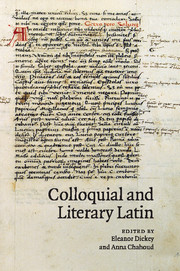Book contents
- Frontmatter
- Contents
- List of contributors
- Acknowledgements
- Foreword (David Langslow)
- PART I THEORETICAL FRAMEWORK
- PART II EARLY LATIN
- PART III CLASSICAL LATIN
- 10 Hyperbaton and register in Cicero
- 11 Notes on the language of Marcus Caelius Rufus
- 12 Syntactic colloquialism in Lucretius
- 13 Campaigning for utilitas: style, grammar and philosophy in C. Iulius Caesar
- 14 The style of the Bellum Hispaniense and the evolution of Roman historiography
- 15 Grist to the mill: the literary uses of the quotidian in Horace, Satire 1.5
- 16 Sermones deorum: divine discourse in Virgil's Aeneid
- PART IV EARLY PRINCIPATE
- PART V LATE LATIN
- Abbreviations
- References
- Subject index
- Index verborum
- Index locorum
10 - Hyperbaton and register in Cicero
Published online by Cambridge University Press: 04 April 2011
- Frontmatter
- Contents
- List of contributors
- Acknowledgements
- Foreword (David Langslow)
- PART I THEORETICAL FRAMEWORK
- PART II EARLY LATIN
- PART III CLASSICAL LATIN
- 10 Hyperbaton and register in Cicero
- 11 Notes on the language of Marcus Caelius Rufus
- 12 Syntactic colloquialism in Lucretius
- 13 Campaigning for utilitas: style, grammar and philosophy in C. Iulius Caesar
- 14 The style of the Bellum Hispaniense and the evolution of Roman historiography
- 15 Grist to the mill: the literary uses of the quotidian in Horace, Satire 1.5
- 16 Sermones deorum: divine discourse in Virgil's Aeneid
- PART IV EARLY PRINCIPATE
- PART V LATE LATIN
- Abbreviations
- References
- Subject index
- Index verborum
- Index locorum
Summary
INTRODUCTION
‘Hyperbaton’ is the name given, originally by rhetoricians, to the phenomenon in both Latin and Greek word order whereby words that are or seem to be syntactically connected (e.g. a noun and an adjective which agrees with it) occur some distance apart, separated by other words that are in grammatical terms less closely connected. A convenient example is given at Rhetorica ad Herennium 4.44: instabilis in istum plurimum fortuna valuit: omnes invidiose eripuit bene vivendi casus facultates, ‘Unstable Fortune has exercised her greatest power on this creature. All the means of living well Chance has jealously taken from him’ (trans. H. Caplan). Rhet. Her. defines the feature as quae verborum perturbat ordinem ‘[the figure] which disturbs the order of words’; its name, which the Romans translated by transgressio or traiectio, means ‘stepping over’, implying that it is a dislocation of some more usual order in which one would not need to step over anything. Standard grammars usually present it as a departure from ‘normal’ or ‘natural’ order, although (as it is unnecessary to point out in the distinguished company of the contributors to this volume and especially of its honorand) any such definition begs a large question about what is to count as normal or natural. Furthermore, the listing of hyperbaton among the ‘figures of speech’ (which has been conventional from ancient times to Kennedy's Latin Primer and beyond) tends to carry at least for a modern reader the implication that it is an artificial rhetorical feature, belonging perhaps to a formalised literary register at some distance from ordinary speech.
- Type
- Chapter
- Information
- Colloquial and Literary Latin , pp. 163 - 185Publisher: Cambridge University PressPrint publication year: 2010
- 7
- Cited by



